
If your furnace is malfunctioning, it could be a faulty control board. Find out what a furnace control board replacement costs for parts, labor, and more.
Don’t let leaky ductwork get you down


Several issues can cause HVAC ductwork to leak water, including clogs, condensation, and a dirty air filter.
In some cases, homeowners can solve the problem with a DIY solution.
Hire an HVAC pro if the problem persists or the underlying cause is a larger issue, like structural damage in the ductwork.
Your HVAC ducts keep your home at a comfortable temperature year-round. But sometimes, that unseen ductwork can start dripping water, which can be concerning. If you’re wondering, “Why is my ductwork leaking water?” the answer is that several issues could cause it. A DIY duct leakage test could help you identify the problem, but you’ll need to call the professionals for repairs in many cases. Learn common causes of leaking ducts and how to address the issue before it worsens.
A condensate drain line removes excess moisture from your AC unit. When that line is clogged, it can cause a backup of water that can leak into your ductwork. Left untreated, a clogged condensate drain line can cause mold, mildew, rust, or flooding in your home.
To unclog a condensate drain line, turn off the unit's power to prevent electrocution. Then, use a wire brush or pipe cleaner to unclog the line. Finally, clean it with vinegar or diluted bleach to remove any residue. If the clog is still there, contact a duct installer near you to troubleshoot the issue.
The condensate line has a drip pan to catch the water as it is removed from the AC unit. If that pan cracks, water can leak from your ductwork.
A cracked drip pan can be replaced, but it’s not a DIY task. Instead, call an HVAC professional to address the issue.

An evaporator coil removes heat from an AC unit, allowing it to cool the air and direct it through the ductwork. But sometimes, the evaporator coil can freeze due to restricted airflow. When it melts, that water can leak into the air ducts and drip down.
To fix the issue, turn off the AC unit and gently wipe the frost off the coil. Check the air vents in each room of your home to see if furniture or rugs are blocking them, which can restrict the airflow and cause the coil to freeze.
If that doesn’t resolve the issue, call an HVAC technician to inspect it. The frozen coil could be caused by a low refrigerant level or a dirty coil, which needs to be addressed by a pro.
If your ducts are not properly insulated, condensation can form on the inside and outside of the ducts. Check to see whether your ducts are adequately insulated. If they aren’t, you can seal leaky ductwork and insulate it by taping fiberglass insulation to the outside of the ducts. You can also hire a pro to insulate your air ducts if you’re not confident you can do it yourself.

Air filters trap dust, allergens, and other debris to prevent them from building up in your HVAC unit. They also stop debris from blowing through the ducts and into your home, which helps maintain good air quality and decrease allergies. But if you don’t change the filter frequently enough, it can become clogged and cause water leaks in your ductwork.
HVAC experts recommend changing your air filter every three to 12 months, depending on your unit type and filter. If you have pets or people in your house with allergies or asthma, you’ll need to change them more often—typically once a month or every other month. Changing an HVAC filter is an easy DIY task.
High humidity levels can cause condensation to form and drip from air ducts. Condensation forms when warm, moist air comes in contact with a cold surface, such as an AC duct. The ideal indoor humidity level is between 30% and 50%, but it can get much higher than that in warmer months, especially in tropical climates.
Proper insulation can help maintain a healthy indoor humidity level. If you need extra help, a dehumidifier can decrease the moisture level inside your home. Installing a whole-house dehumidifier costs between $1,300 and $2,800, with an average of $1,500. This type of dehumidifier is installed on your AC unit return. Alternatively, a portable dehumidifier can reduce the moisture level in a single room.
From average costs to expert advice, get all the answers you need to get your job done.

If your furnace is malfunctioning, it could be a faulty control board. Find out what a furnace control board replacement costs for parts, labor, and more.

Ductless heating and cooling system costs vary depending on size, type, and energy efficiency. Their installation is likely to lower your energy bills.

Discover how much R-22 refrigerant costs per pound based on factors such as the size, age, and location of your HVAC unit.

Discover the average air handler replacement cost, including labor and materials, plus expert tips to help you budget and save on your HVAC upgrade.

Learn how to add Freon to your AC unit with our step-by-step guide, and keep your home cool with a properly functioning AC unit.

Not sure who to hire to install radiant floor heating? Learn which pros handle radiant floor heating installation and how the work comes together.